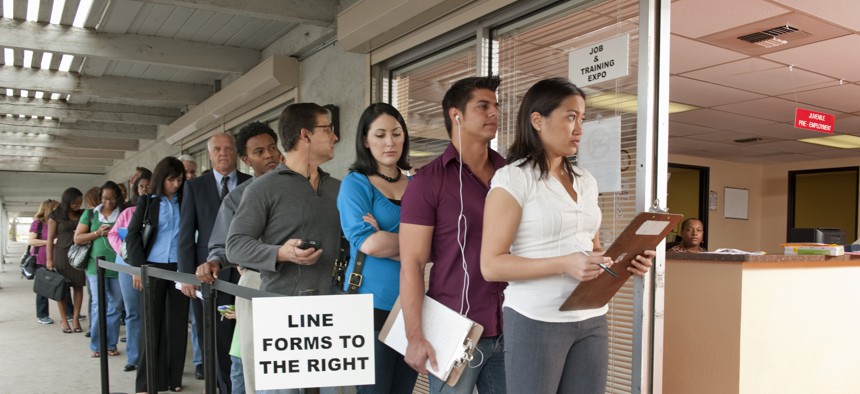Republicans Complain Biden Let States ‘Off the Hook’ With Unemployment Fraud

Getty Images
The GOP lawmakers are arguing states and the federal Labor Department need to do more to prevent theft of the benefits and to recoup improper payments.
House Republicans on Tuesday cast blame on the Biden administration for an estimated $80 billion in improper unemployment benefits that have been handed out during the pandemic.
In part, Republicans on the House Ways and Means Committee criticized a Labor Department decision, which they said in a letter to Democrats, “let states off the hook for due diligence and fact finding for large volumes of suspicious unemployment claims potentially involving billions of fraudulently obtained taxpayer dollars.”
In addition, Rep. Kevin Brady, the top Republican on the House Ways and Means Committee, speaking at a virtual GOP roundtable discussion, also put the onus on states to do more to prevent people, including those from other counties, from fraudulently getting unemployment benefits.
Brady said he hoped other states would follow the lead of a bill proposed in Missouri, in which the state would do more to verify whether applicants are eligible for unemployment, including checking to see if the people are dead.
“I wish we had more states doing what you’re doing in Missouri,” Brady, of Texas, said during the roundtable, which was organized by Republicans scrutinizing the improper unemployment payments.
The Labor Department estimates there were $78 billion in overpayments between April 2020 and December 2021, said Seto Badoyan, the Government Accountability Office’s director of audit services. This was after Congress increased unemployment benefits and expanded them to cover “gig” workers and others, as part of the pandemic relief measures in the CARES Act. States, meanwhile, have identified $29 billion in improper payments.
Badoyan said the watchdog agency is still trying to come up with a figure of its own.
According to an investigation by ProPublica, a widespread effort to fraudulently obtain unemployment benefits included the use of automated software programs, or “bots”, to file online claims in bulk. And efforts as far away as China and West Africa, have organized low-wage teams to file phony claims.
Some states were particularly hard hit by fraud attempts. In Vermont, state officials suspected that as many as 90% of claims coming in at one point last year were fraudulent. Rhode Island’s labor agency said in March 2021 that it suspected fraud in 43% of the claims it had received during the year leading up to that time.
A key issue in many cases was that in the urgency to get money in the hands of people who’d lost jobs, the coronavirus relief package waived the usual requirements for applicants to show they had worked enough hours to qualify, relying instead on self-certification.
Though the CARES Act was passed during the Trump administration, the Republican lawmakers said Democrats in Congress have opposed efforts to tighten the requirements for unemployment programs.
In a letter to House Ways and Means Committee chairman Richard Neal, a Massachusetts Democrat, Republicans also criticized Labor Department guidance issued this month.
The guidance allowed states to pass on trying to recover unemployment benefit overpayments when it was not the fault of those who received the money—including in cases when the state had erred and paid benefits to those who said they were not available to work, or when states miscalculated how much people should receive.
“The Biden Administration has taken unilateral action to sweep suspected fraud under the rug, releasing new guidance allowing states to waive large numbers of suspicious claims and forgo restitution for taxpayers,” the Republicans wrote Neal in the letter, which was sent in conjunction with the roundtable.
In addition, Republicans blasted Neal for not holding a hearing to discuss how to stop improper payments.
“Despite repeated calls for oversight hearings, including a letter we sent you on March 15, 2021, which received no response, Democrats continue to turn a blind eye to what is possibly the greatest theft of taxpayer dollars in American history, allowing cybercriminals and international crime rings to rob the American people and divert funds from unemployed workers,” the letter said.
A spokesman for Neal did not return a request for comment. The Labor Department also didn’t immediately provide a response to the Republicans’ comments on Tuesday.
In addition, Badoyan expressed concern during the discussion that the department has not yet acted on a series of GAO’s recommendations from last October, including creating a special unit focused on preventing fraud. Badoyan also said it’s unclear what the department is planning to do on this front.
“Unfortunately, we don’t have any details or documentation of what those plans might be,” he told the Republican lawmakers.
By not doing more, Brady accused Biden of trying to “sweep the fraud under the rug.”
“This is a cover-up from the Biden administration on an issue that has cost taxpayers hundreds of billions,” he said.
Republicans also highlighted a bill proposed by Missouri state Sen. Andrew Koenig, a Republican. The bill would, among other things, require the state to check whether those applying for unemployment benefits are incarcerated, dead, or have been hired for a job. Koenig also said the state would check to see if a person turned down a job offer, making them ineligible for unemployment.
“If Washington isn’t going to do the job, then state legislatures should look to see what it will take to recover tax dollars,” U.S. Rep. Jason Smith, a Republican from Missouri, said during Tuesday’s roundtable.
Kery Murakami is a senior reporter for Route Fifty based in Washington, D.C.
NEXT STORY: A Parched West Remains Divided on Desalinating Seawater






